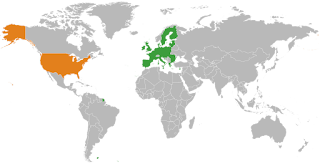The Trans-Atlantic Drift
President Trump's ditching of the Iran deal was a horrid decision. And, as if destabilizing the Middle East and granting Iran the capability to make a nuclear bomb wasn't enough, Trump also could have further widened a growing gap between the United States and Europe.
Merkel, Macron, and the European Union are attempting a last-ditch effort to save the Iran deal. Clearly, the European Union disagrees with the foreign policy agenda set by the President of the United States. This, in itself, is not the worst thing that can happen between allies. France left NATO in 1967, but the US has still maintained a good relationship with France. European powers developed nuclear weapons during the cold war, in large part due to their desire to be more independent from America's foreign policy. The US and Europe were never in 100%, total agreement with each other - but there was a consensus on overall foreign policy goals, and the two sides of the Atlantic were overall on the same page.
A worrying trend has begun, nevertheless, and this trend isn't unique to Donald Trump. When the US invaded Iraq in 2003, France and Germany were vocal in their opposition. Even under the previous administration, Europe was caught off-guard when Obama claimed that he was "America's first Pacific president". Trump has only continued this trend, ignoring Article V during his June 2017 NATO summit address and recklessly stating that NATO allies who do not pay their fair share of money into national defense "will be dealt with". If one analyzes this situation from a European perspective, it appears that the United States has little to no care about what Europe's stance on a certain foreign policy issue is. America appears reckless and unpredictable, and perhaps even unreliable as an ally. This is not an ideal situation.
The short-term solution, therefore, for the woes in the American-European relationship, is more communication. American consultation with Europe is a necessity in the future - especially with regards to dangerous issues such as that of North Korea and Syria. This could actually work to the advantage of Trump as well - for example, if Trump could have managed to flip Macron into opposing the Iran deal, it would be a major political victory for the Trump administration.
In terms of the long-run, US-Europe collaboration in a sort of "Western alliance" is not only desired but needed. Transatlantic cooperation was necessary during the Cold War, when the USSR equalized the United States in terms of sheer strength. In the future, China is bound to equalize the United States in strength, and out of the natural necessity of international alliances, America and Europe will once more be forced into each-other's arms. This partnership would most likely have the legal backing of the TTIP, and integrating NAFTA and the European Union would also be welcome. This, however, describes an ideal world.
Of course, in reality, populist movements on both sides of the Atlantic are decimating the chance for a trans-Atlantic partnership of any sort. Donald Trump would never agree to TTIP. Viktor Orban, similarly, would never agree to anything involving further integrating with the US or the European Union. Thus, sadly, it is likely that the US and Europe will drift even further apart in the long term - bad news for both sides of the Atlantic, but bad news that can never be seen by blind, populist eyes. Unless these populist movements are defeated, the future of trans-Atlantic relations will be grim.



Comments
Post a Comment